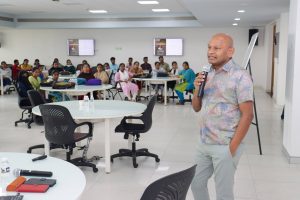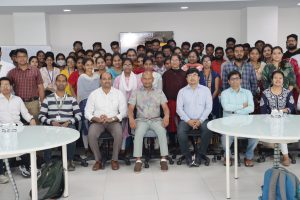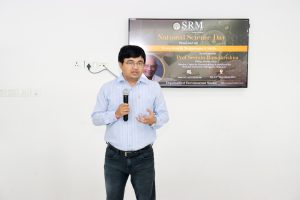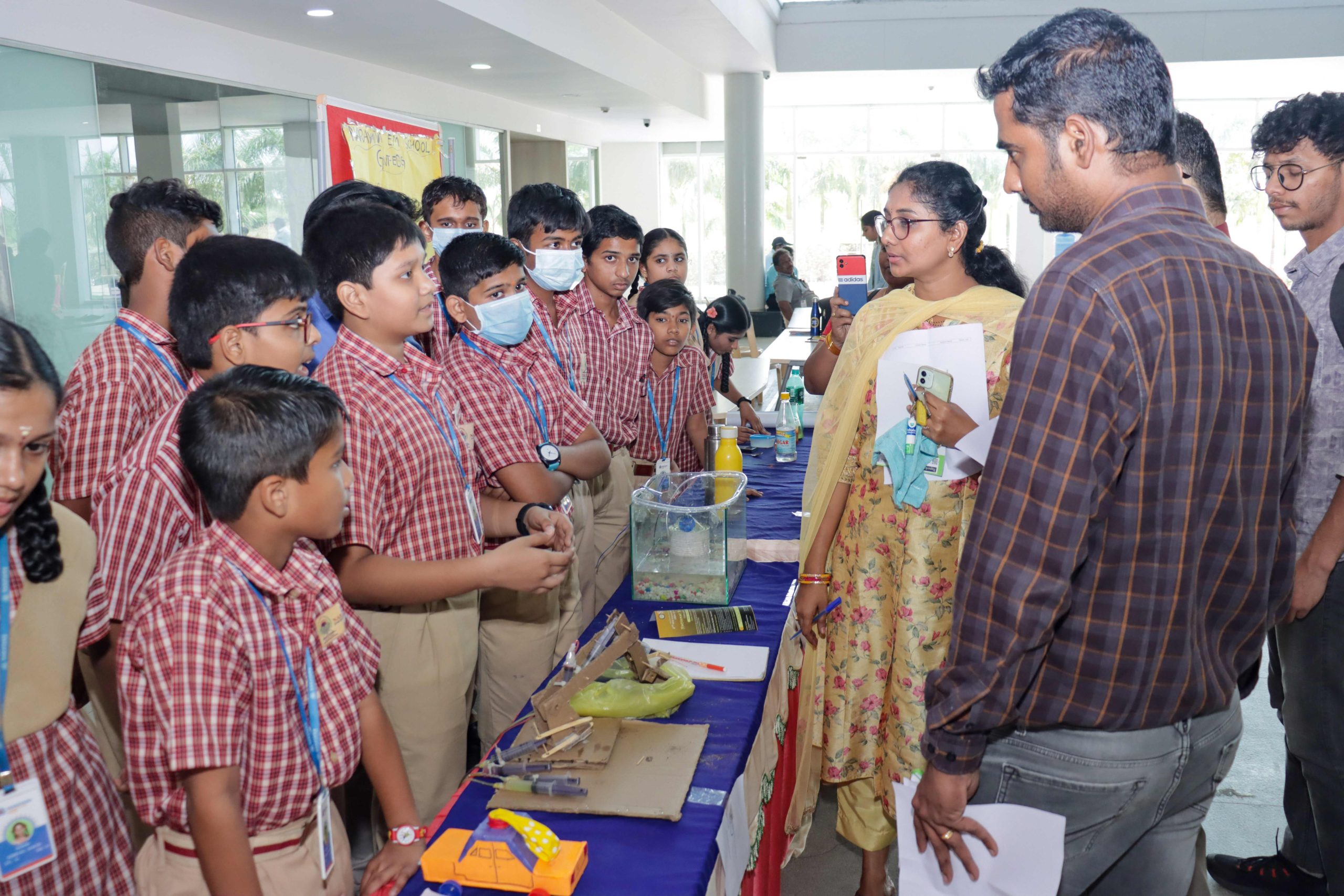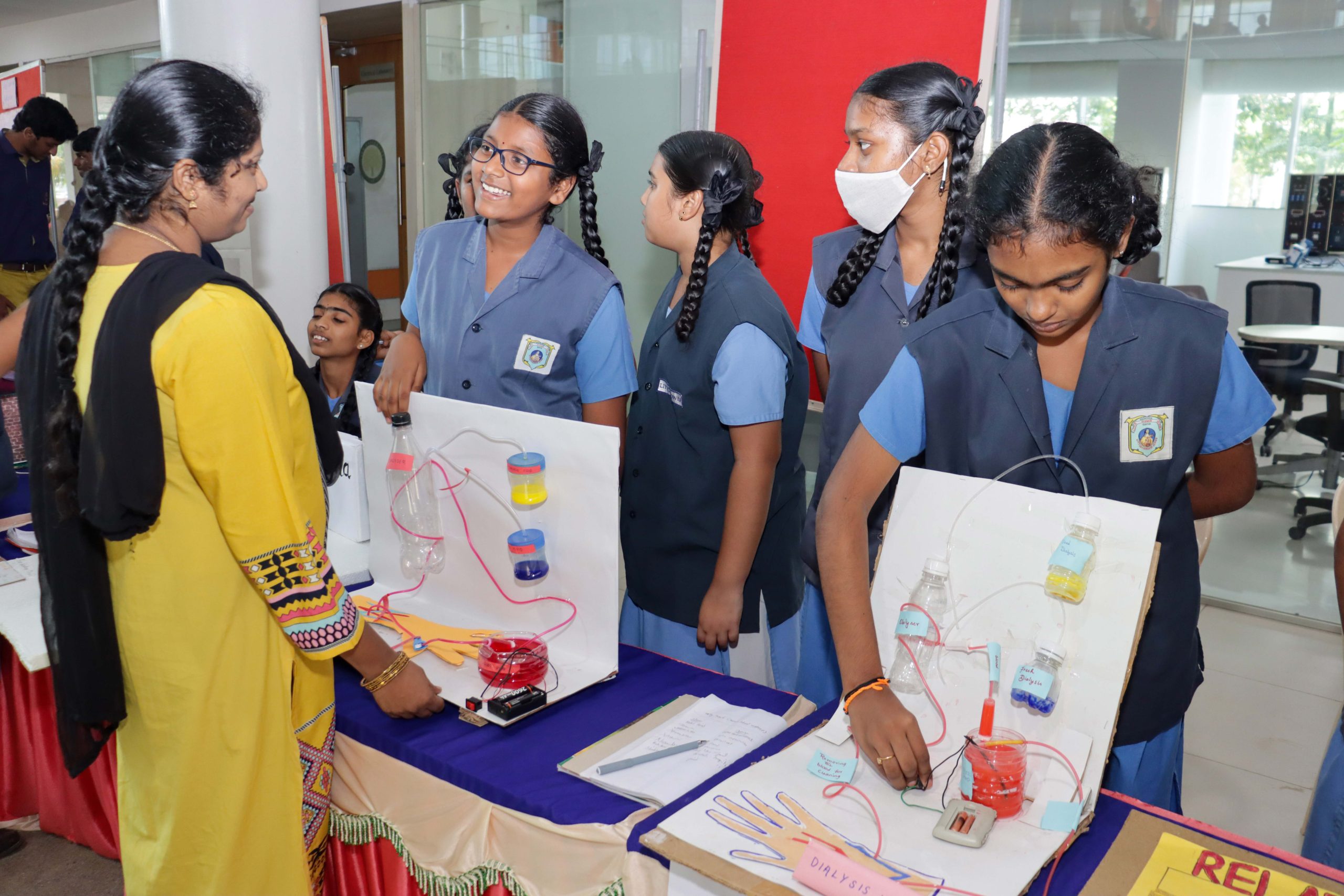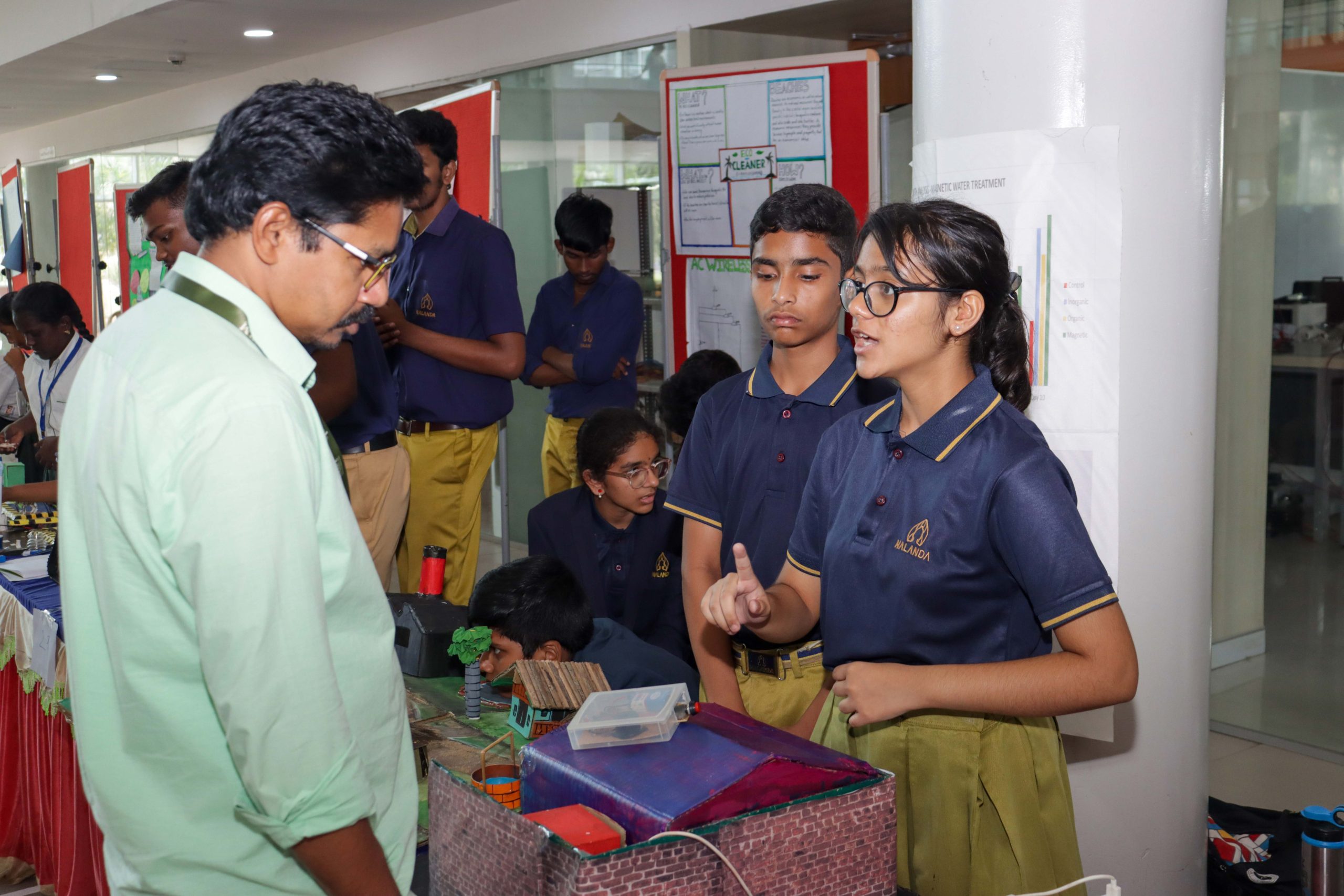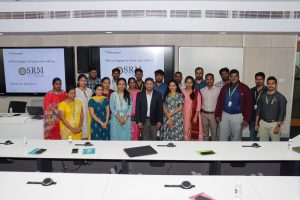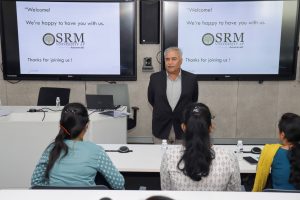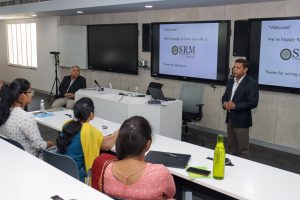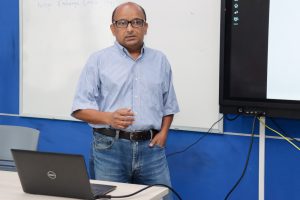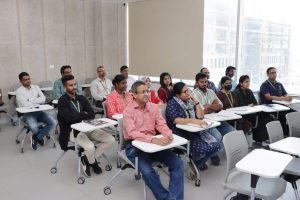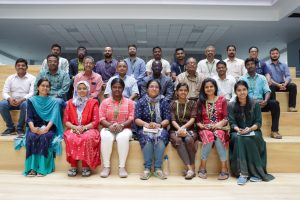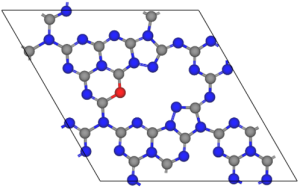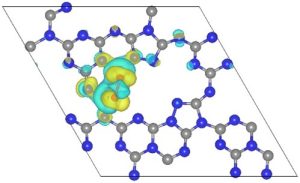SRM-AP All News
ALL News
- Polydisciplinary Approach: Key to Green Economy March 10, 2023
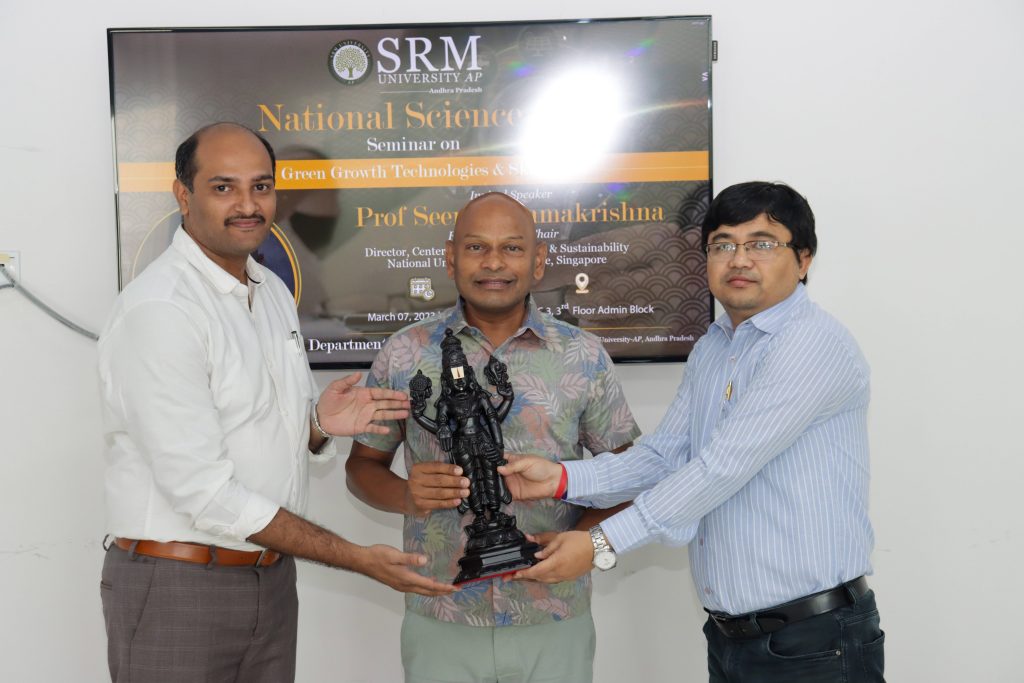
The Department of Environmental Science and Engineering, SRM University-AP organised a National Science Day seminar on “Green Growth Technologies and Skills” on March 07, 2023, to promote awareness on the critical need for sustainable development and a green economy for human sustenance. Prof. Seeram Ramakrishna, FREng, Everest Chair, Director-Center for Nanotechnology & Sustainability, National University of Singapore delivered the session in the presence of Prof. Ranjit Thapa, Dean-School of Engineering and Sciences (SEAS); Dr Karthik Rajendran, Head- Department of Environmental Science and Engineering; Dr Shoji D Thottathil, Assistant Professor, SRM AP and other faculty and students of the university.
“Many challenges and needs of human beings which include climate change, extreme weather, biodiversity loss, food supply, nutrition, healthcare, security, urbanisation, sanitisation, clean water and energy, resources, shelter, transportation and circular economy demand polydisciplinary knowledge and effort,” said Prof. Ramakrishna while addressing the audience. He emphasised that a circular economy or Global commons requires the cooperation and contribution of countries and communities to actualise progress in sustainability. In his talk, Prof. Ramakrishna posited that India had undertaken a progressive stance that will lead to clear advancements in the next 25 years with respect to demographics, economic policies etc.
Prof. Ranjit Thapa, Dean – SEAS remarked that SRM University-AP as a research-intensive institute, with an interdisciplinary academic approach and a culture of research, entrepreneurship and innovation, will promote green growth technology and sustainable development as an integral part of the academia. The seminar was also attended by undergraduate and postgraduate students from neighbouring colleges including Andhra Loyola College, Hindu College, and KBN college. A memento of appreciation was presented to Prof. Ramakrishna by Prof. Ranjit Thapa and Dr Karthik Rajendran. Dr Pankaj Pathak, Assistant Professor, Department of Environmental Science and Engineering delivered the vote of thanks.
Continue reading → - Social Support and the Resilience Among Young Adults in Kashmir March 7, 2023
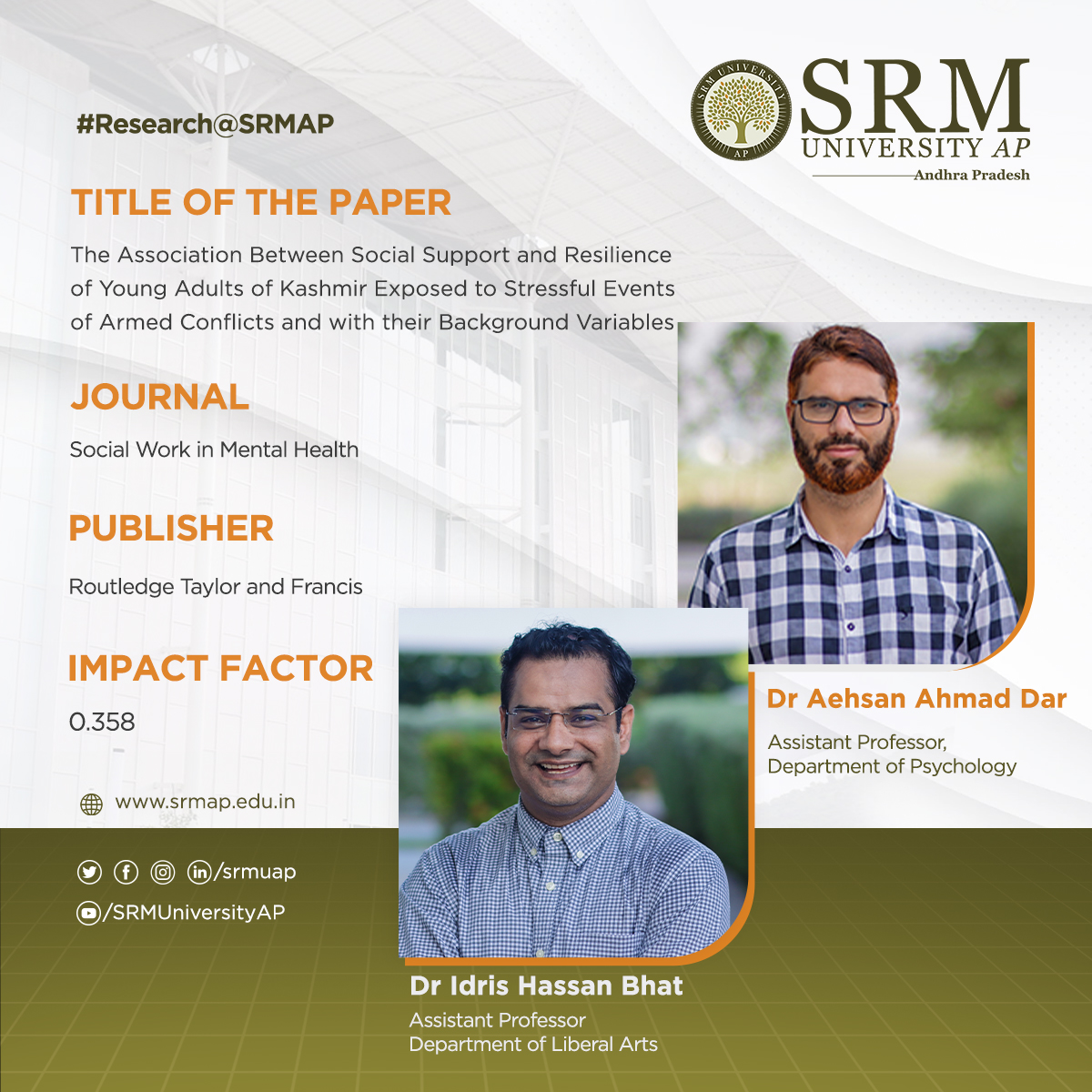 The latest research paper of Dr Aehsan Ahmad Dar, Assistant Professor, Department of Psychology, and Dr Idris Hassan Bhat, Assistant Professor, Department of Liberal Arts, examines the relationship between social support and resilience among young adults in Kashmir who have been exposed to the traumatic events of armed conflicts. His paper titled The Association Between Social Support and Resilience of Young Adults of Kashmir Exposed to Stressful Events of Armed Conflicts and with Their Background Variables was published in the esteemed journal Social Work in Mental Health, which is issued by the reputed publisher Routledge Taylor and Francis.
The latest research paper of Dr Aehsan Ahmad Dar, Assistant Professor, Department of Psychology, and Dr Idris Hassan Bhat, Assistant Professor, Department of Liberal Arts, examines the relationship between social support and resilience among young adults in Kashmir who have been exposed to the traumatic events of armed conflicts. His paper titled The Association Between Social Support and Resilience of Young Adults of Kashmir Exposed to Stressful Events of Armed Conflicts and with Their Background Variables was published in the esteemed journal Social Work in Mental Health, which is issued by the reputed publisher Routledge Taylor and Francis.Through the research, they found that social support plays a crucial role in enhancing the resilience of young adults and reducing the adverse effects of traumatic experiences. This publication is a significant contribution to the field of social work and mental health, particularly in the context of the ongoing conflict in Kashmir. The findings of the researchers highlight the importance of social support in promoting the mental health and well-being of individuals who have experienced trauma.
Abstract
The current study examined the association of social support and background variables with resilience among young adults exposed to traumatic and stressful events of armed conflict in Kashmir, India. Data were collected from 693 participants using a multi-stage sampling method. Findings revealed that social support and gender were positively associated with resilience, whereas education, income, and maternal education were negatively associated with resilience. Moreover, feeling insecure and psychologically distressed as a result of the conflict was negatively associated with resilience, whereas the perception that the Kashmir conflict would be resolved was positively associated with resilience. The findings suggest fostering resilience in this population.
Continue reading → - Prof. Bharadhwaj Delivers Keynote Address at International Conference March 1, 2023
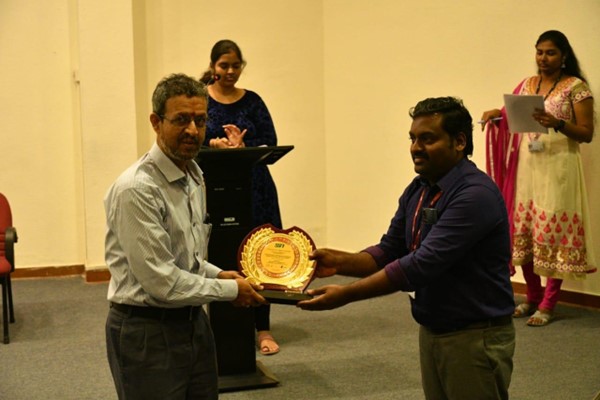
The Paari School of Business is a premier management abode for highly-qualified faculty whose expertise is spread across various fields and domains of business studies. A distinguished academician and Dean of Paari School of Business, Prof. Bharadhwaj Sivakumaran, was invited to the International Conference on Emerging Trends in Business and Management organised by SSN School of Management, Chennai, Tamil Nadu on February 24-25, 2023, to deliver the keynote address. Prof. Bharadhwaj expounded on the theme of the Conference and elaborated on his take on Business Intelligence and Analytics as drivers for Digital Transformation. Prof. Bharadhwaj also discussed the techniques involved in publishing high-quality journals and addressed numerous questions from the attendees.
Continue reading → - Global Science for Global Wellbeing: National Science Day at SRM University-AP February 28, 2023
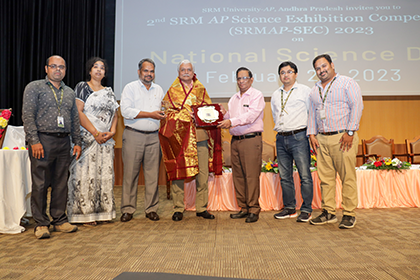
SRM University-AP celebrated National Science Day on Tuesday, February 28, 2023, to promote scientific temper and encourage scientific development in the country. National Science Day is celebrated annually on February 28th to honour the discovery of the Raman Effect by Indian physicist Sir C V Raman, who received the Nobel Prize in 1930 for his discovery. Dr Mukhesh Tripathi, Director, AIIMS, Mangalagiri, inaugurated the celebrations at SRM University-AP.
“Technology may die with you in the textbooks, classrooms and laboratories if not developed further for the benefit of common people, “said Dr Mukhesh Tripathi as he addressed the students and elaborated on how research should be made applicable to advancing humankind. Prof. D Narayana Rao, Pro-Vice-Chancellor of SRM AP, delivered the welcome address. He requested the Chief Guest to establish a Centre of Excellence for AI in Drug Development at SRM AP. Prof. Ranjit Thapa, Dean-School of Engineering and Sciences, SRM AP, introduced the Chief Guest. Prof. D Narayana Rao felicitated the Chief Guest with a memento. The dignitaries interacted with the students and answered their queries about recent advancements in science and technology. Dr Vinayak Kalluri, Dean-Academic Affairs, SRM AP, gave the vote of thanks.
The Second SRM AP Science Exhibition Competition (SRM AP-SEC) and a Tour of the Research Laboratories of SRM AP were also held as part of the celebrations. Over 200 students from the neighbouring schools participated in the National Science Day celebrations, and around 43 exhibits were displayed at SRM AP-SEC. Nalanda Vidya Niketan and GEMS school won first place in the senior school category and junior school category of the exhibition competition, respectively. The winners were awarded mementoes and certificates at the end of the ceremony.
Global Science for Global Wellbeing is the theme of this year’s National Science Day as it indicates the purpose of raising public appreciation of the scientific issues in a global context which has a bearing upon global well-being.
Continue reading → - New Employee Induction Programme February 23, 2023
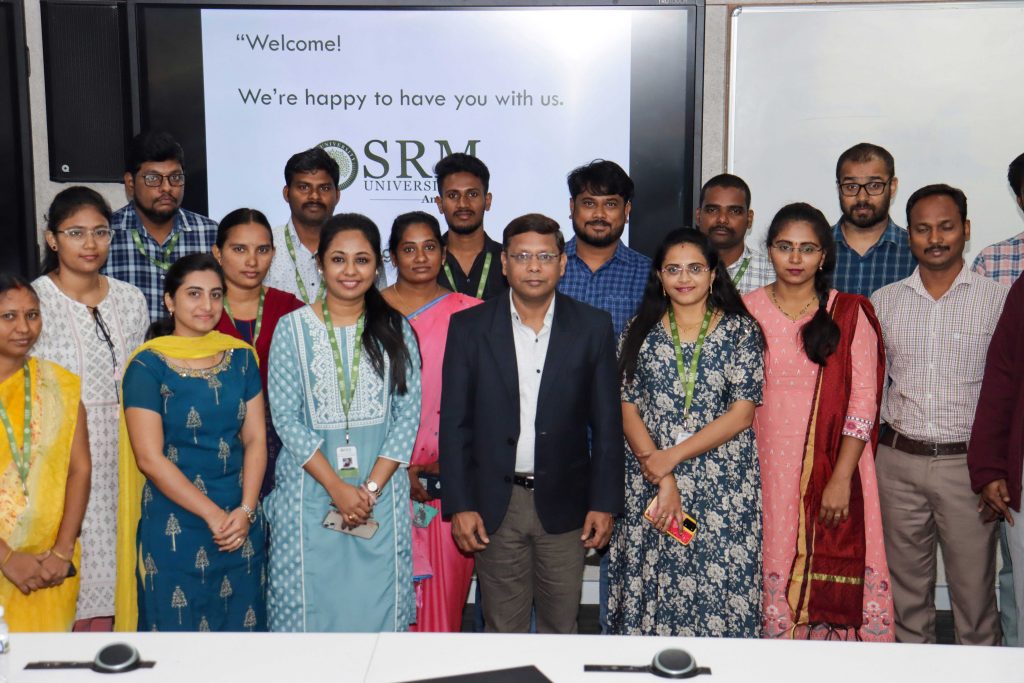
The Directorate of Human Resources of a leading tertiary institute such as SRM University-AP plays a significant role in various duties including the employment of professors, educational specialists and support staff, and auxiliary personnel such as administrative assistants and maintenance workers, performing human resource management, conducting interviews and employee orientations, administering employee benefits among others. Recently The Directorate of HR organised a New Employee Induction Programme on February 20, 2023, facilitating a smooth transition of new joiners into the constructive working environment of SRM AP. A team comprising of Ms Surekha P, Mr B V S Anvesh, Mr Satish and Mr Riaz organised and conducted the programme with the support of the Directorate.
The new joiners were welcomed by the HR representative and presented with a welcome kit. The induction process including the collection and cross-checking of the joining documents and the creation of employee email Id, employee code, HR service login in ERP and temporary Id card followed this. The new joiners were then introduced to the heads of the institution, Vice Chancellor, Registrar, Deans and their respective HODs. Lunch and a campus tour were also provided by the HR team. A detailed overview of the university, SRM University-AP, SRM group, schools, departments, institution policy, HR policy, transportation and residential facilities were also given. The Directorate of Numan Resources has organised the Induction programme to ensure conducive support to new joiners to help them settle into the university seamlessly.
Continue reading → - A Close Discourse on Research with Prof. Piyush Sharma February 23, 2023
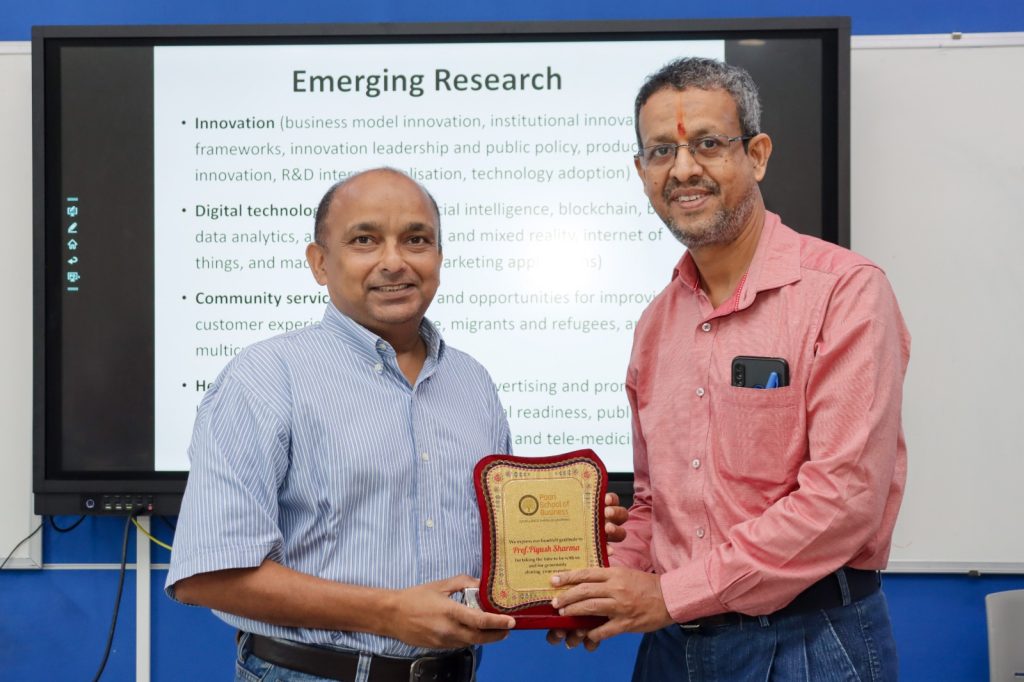
The Paari School of Business prioritises top-tier knowledge acquisition in business and management studies collaborating with renowned academicians, business tycoons, entrepreneurs and researchers to guarantee a premier management learning experience. Engagement with experts in the domain fortifies the significance of networking and research in the evolving business market. On this note, the Paari School of Business organised a Research Talk by John Curtin Distinguished Professor Piyush Sharma on February 13, 2023. The noted academician expounded on “My Research Journey and Emerging Research Interests in Marketing” and engaged in an interactive session with the faculty members and research scholars of the school. In his session, Professor Sharma provided insights into the emerging research interests in marketing and the audience had the opportunity to discuss the impressive and impactful research journey of the distinguished professor.
About the speaker
Professor Piyush Sharma has over thirty years of professional experience, divided almost equally between industry and academia. He is currently affiliated with the School of Marketing at Curtin University, Australia and also serves as a member of the Editorial Review Boards for several esteemed journals, including the Journal of International Business Studies, the Journal of the Academy of Marketing Science, the Journal of Service Research, the European Journal of Marketing, the Journal of Service Theory and Practice, the International Journal of Emerging Markets, the Journal of Creative Communications, and the Journal of Indian Business Research.
Professor Sharma is ranked among the top 2% of researchers in the world across all fields of research and ranked among the top 60 business researchers in the global P-rankings based on publications in ABDC journals since 2013. His research covers services and international marketing, cross-cultural consumer behaviour, self-regulation and regulatory failure, branding and marketing strategy, marketing-finance interface, organisational behaviour and management, among others.
Continue reading → - Book Review Published on the LSE Review of Books Website February 22, 2023
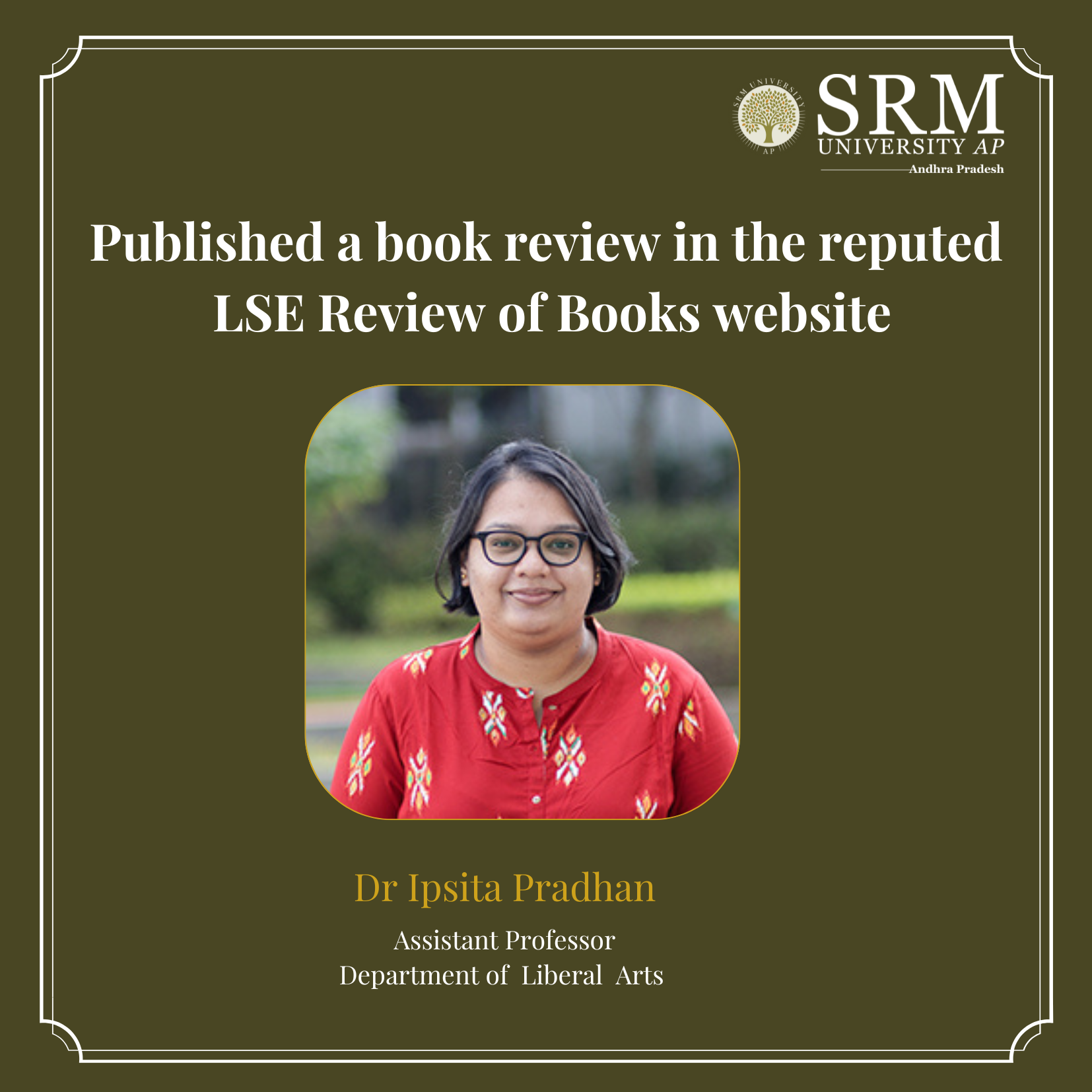 Assistant Professor Dr Ipsita Pradhan, Department of Liberal Arts, has recently published a book review on the renowned LSE Review of Books website. In her recent review, Dr Pradhan offers insightful perspectives on the book Confidence Culture by Shani Orgad and Rosalind Gill. This crucially important book appeals to media studies, American studies, and feminist scholars, as well as a wide public audience.
Assistant Professor Dr Ipsita Pradhan, Department of Liberal Arts, has recently published a book review on the renowned LSE Review of Books website. In her recent review, Dr Pradhan offers insightful perspectives on the book Confidence Culture by Shani Orgad and Rosalind Gill. This crucially important book appeals to media studies, American studies, and feminist scholars, as well as a wide public audience.Dr Ipsita Pradhan elaborates on how the book assures that self-love affirmations in contemporary times are not free from the disciplinarian gaze of the market and its neoliberal capitalist mechanisms, as it is often measured through one’s productivity. She commends the authors’ rigorous research and compelling arguments, stating that the book offers a much-needed critique of the prevailing cultural narrative around confidence.
“In Confidence Culture, Shani Orgad and Rosalind Gill explore the demands that the cultural imperative of confidence particularly places on women. Enriched by abundant examples drawn from across popular culture to show how ‘confidence culture’ puts the onus on individuals to navigate and solve systemic problems, this book is necessary reading for scholars of gender, media studies and sociology”, writes Dr Ipsita Pradhan.
LSE Review of Books publishes daily reviews of academic books across the social sciences. It aims to facilitate the sharing and exchange of knowledge between experts within and outside the academy and to open up academic research to increase its impact. LSE Review of Books is a forum to encourage engagement with the latest academic publications across the social sciences and the humanities.
Click to read the full book review!
Continue reading → - Boosting Transitive Communication in Large-scale IoT Networks February 21, 2023
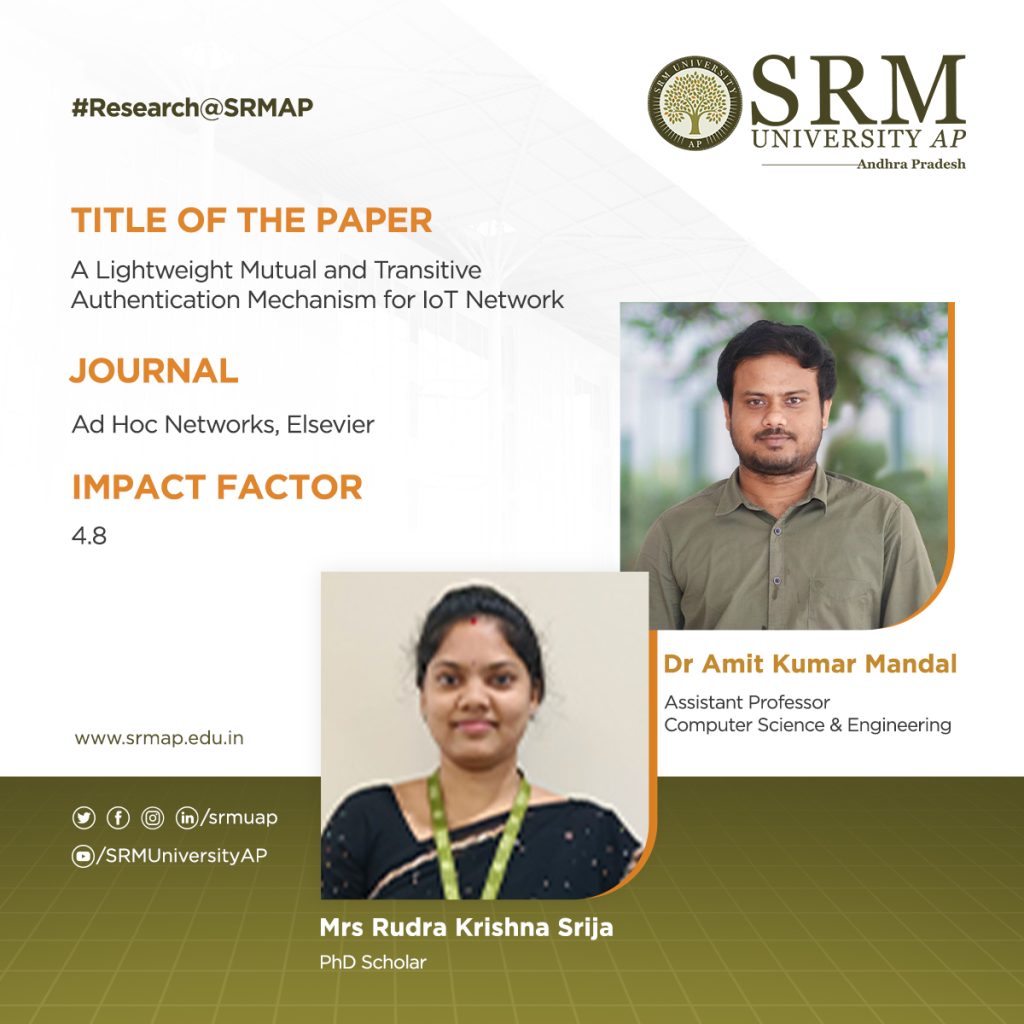
Complex IoT networks comprise multiple devices connected to the gateway. A smoother functioning is ensured through new techniques for device authentication to the gateway. On this note, the research paper titled “A Lightweight Mutual and Transitive Authentication Mechanism for IoT Network” has been published by Dr Amit Kumar Mandal, Assistant Professor, Department of Computer Science and Engineering and his research scholar Mrs Rudra Krishna Srija in the Q1 Journal Ad Hoc Networks, Elsevier having an impact factor of 4.8. The research details the use of the polynomial-based protocol in enhancing device connection for transitive communication.
Abstract of the paper
In large and complex IoT systems like the smart city or smart industry which consist of thousands of connected devices, it may not always be feasible to be directly connected to the gateway but it may be possible to be connected to another device. Therefore, already authenticated devices should facilitate the new device’s authentication by the gateway. To address this issue, the existing protocols use multiple authentication protocols based on different cryptography techniques, which are difficult to implement and manage in resource-constrained IoT devices. In this paper, we propose a Transitive device authentication protocol based on the Chebyshev polynomial.
The work is primarily aimed at improving transitive communication in machine-to-machine communication or device-to-device communication in large-scale heterogeneous IoT network scenarios. The research team targets to investigate the benefits of adopting the designed protocol in particular within low-power and lossy networks in the future.
Collaborations
Università Ca Foscari Venezia, Venice, Italy
Continue reading → - Synergistic Effects of CN in Sonophotocatalytic Degradation February 21, 2023
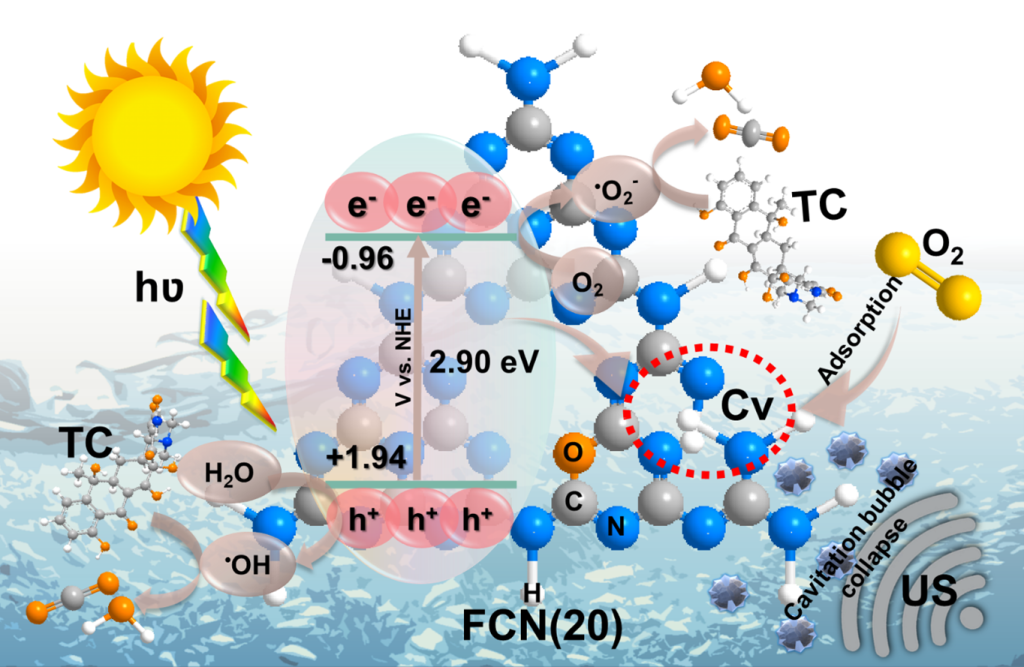
The Department of Physics is pleased to announce that Professor Ranjit Thapa, Dean-School of Engineering and Sciences (SEAS) and Professor of Physics along with his PhD scholar, Mr E S Erakulan, has published a groundbreaking paper titled “Scrutinizing the Role of Tunable Carbon Vacancies in g-C3N4 Nanosheets for Efficient Sonophotocatalytic Degradation of Tetracycline in Diverse Water Matrices: Experimental study and theoretical calculation” in the prestigious Chemical Engineering Journal with an impact factor of 16.744. The paper offers crucial insights into the role of controllable defects in the sonophotocatalytic degradation of tetracycline (TC) antibiotics from polluted water.
Abstract of the paper
Metal-free polymeric graphitic carbon nitride (CN) materials are robust and stable visible-light-driven photocatalysts that have recently piqued interest in photocatalytic applications. Its photocatalytic performance is restricted remarkably due to moderate oxidation ability and fast charge carrier recombination rate. To address these issues, we engineered carbon-vacant CN (FCN) using a facile formalin-assisted thermal polymerization of molten CN precursor in which the carbon vacancies (C v ) were regulated by altering formalin dosage. Consequently, FCN catalysts revealed C v concentration-dependent sonophotocatalytic degradation of Tetracycline (TC) antibiotics over diverse water matrices. The optimal FCN exhibited complete TC degradation efficiency within 60 min with a synergy index of 1.4, which is approximately 2.6 times higher than that of pristine CN. The enhanced sonophotocatalytic performance was mainly due to the synergistic effect of ultrasound and light irradiation. The C v formation also resulted in enhanced charge carrier transportation and facilitated oxygen adsorption at the C V site of FCN – supported by both experimental study and theoretical calculation. Subsequently, FCN generated abundant reactive active oxygen species including, •O 2 –, as well as indirectly •OH which played a significant role in the degradation pathway and mineralisation of the TC molecules. This study provides insight into understanding the correlation between controllable defects and sonophotocatalytic degradation properties of the self-doped and deficient FCN.
In this research, Prof. Thapa and his team utilised a facile formalin-assisted thermal polymerization technique to fabricate metal-free polymeric graphitic carbon nitride (CN) materials. These materials have been gaining increasing interest as photocatalysts, although their photocatalytic performance has been restricted due to moderate oxidation ability and fast charge carrier recombination rate. To address these issues, the researchers engineered carbon-vacant CN (FCN) by regulating carbon vacancies (Cv) with formalin dosage. The optimal FCN catalyst exhibited complete TC degradation within 60 minutes with a synergy index of 1.4, which is approximately 2.6 times higher than pristine CN.
Emerging pollutants, such as antibiotics discharged from pharmaceutical companies, have detrimental effects on living organisms and can cause drug resistance through gene transmission. The removal of TC from water requires efficient and sustainable strategies. A detailed understanding of the synergistic effects of the defect and self-doped CN in sonophotocatalytic degradation could pave the way for the destruction of various recalcitrant pollutants in an aqueous environment.
Collaborations
- Ms Mani Preeyanghaa, Department of Physics and Nanotechnology, SRM Institute of Science and Technology, Kattankulathur, Chennai.
- Prof. Bernaurdshaw Neppolian, Department of Physics and Nanotechnology, SRM Institute of Science and Technology, Kattankulathur, Chennai.
Overall, the research presents exciting possibilities for future projects in the field of sonophotocatalytic degradation and provides a significant contribution to the scientific community’s understanding of controllable defects in CN materials.
Continue reading → - Reshaping the world: Dr M Mallikarjuna Rao Establishes Novel Start-up Venture February 20, 2023
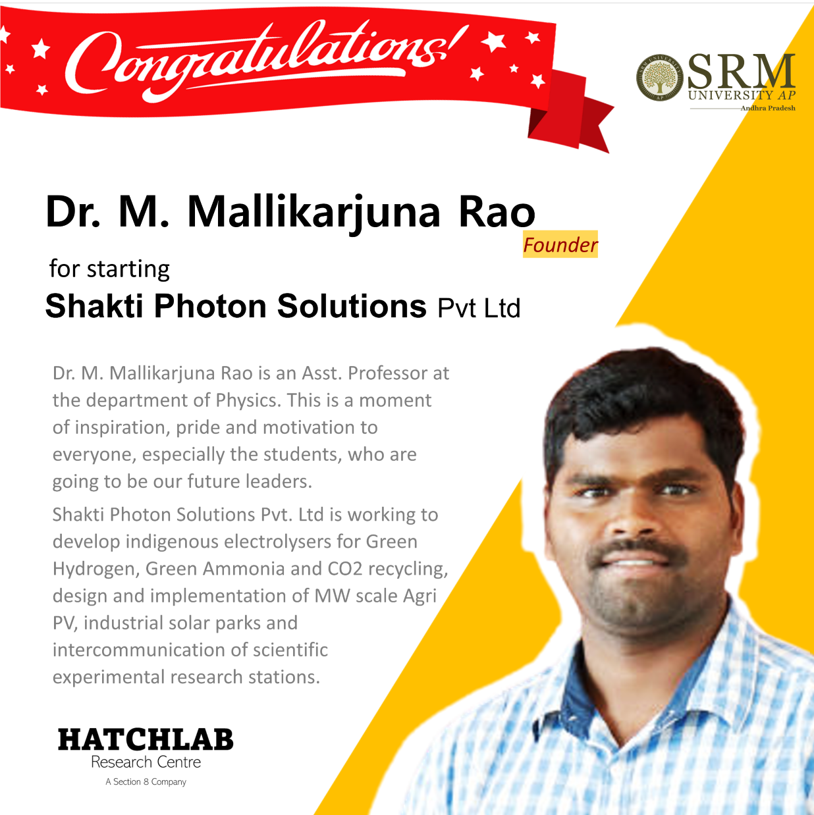
SRM University-AP manifests a supportive ecosystem for entrepreneurial ventures and start-ups with high potential from our ingenious students and faculty. The most recent faculty-led venture accomplishment was by Dr M Mallikarjuna Rao, Assistant Professor, Department of Physics who has established his very own start-up enterprise, Shakti Photon Solutions Pvt Ltd. The Hatchlab Research Centre and the Directorate of Innovation and Entrepreneurship had imparted unrelenting support to Dr Rao in materialising his inventive idea into actuality.
Shakti Photon Solutions Pvt. Ltd aims to develop Indigenous electrolysers for Green Hydrogen, Green Ammonia and CO2 recycling, Design and implement MW scale Agri PV, Industrial solar parks and Intercommunication of scientific experimental research stations. The venture has successfully completed the prototype phase and is ready for commercialisation and production.
Kudos to our faculty champions for their effort and dedication to great ventures with huge potential and for inspiring budding entrepreneurs to achieve success!
Continue reading →


